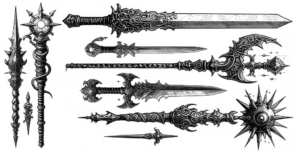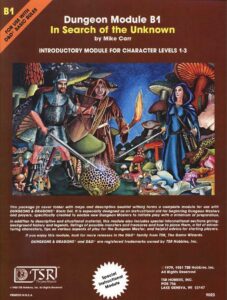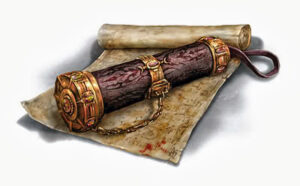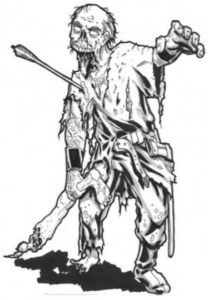 One of the things that always bothered me about the 6 ability checks of D&D was the inflexibility in how difficulty checks are applied to gameplay. To search you ALWAYS add your Wisdom, to break down a door you always use you strength, etc, etc. But as life teaches all, there is more than one way to skin a cat.
One of the things that always bothered me about the 6 ability checks of D&D was the inflexibility in how difficulty checks are applied to gameplay. To search you ALWAYS add your Wisdom, to break down a door you always use you strength, etc, etc. But as life teaches all, there is more than one way to skin a cat.
So I propose moving from a rigid mechanic system that dictates what skill you MUST use for a task to a more flexible, player driven, skill check. This would replace difficulty checks and saving throws while keeping the combat system as is. That being said if the player is unable to come up with a good idea, we still keep the fall back on to the traditional mechanics via providing usage examples of each skill.
Here’s an example how it would work:
A player has to climb a sheer cliff to get to the archers above. There are multiple ways this could be approached.
The player would then say something like:
Because I am very strong (+2 strength) I should be able to muscle my way up the cliff.
or
Because I am very dexterous (+3 dexterity) I should be able to pick my way up the cliff.
or
Because I am very wise (+2 wisdom) I would intuitively know the best way up the cliff
or
Because I am very beautiful (+3 charisma) I’ll try to flirt with the archers to get them to come to me.
In each example, the DUNGEON MASTER would determine whether or not the player’s idea on how they would tackle the obstacle would work. Then roll against a predetermined Difficulty Check (DC) and describe the result. The rule of thumb is if it is a plausible approach to a problem it should be allowed.
I think this has some positive improvements to gameplay:
- The players are encouraged to think outside the box.
- Players are more engaged in the gameplay as their crazy ideas succeed or fail.
- BONUS: Adds variety and role playing to more situations.
- BONUS BONUS: The slave to the rules is lessened as bonuses become more subjective.
A good question about this flex check change from Google+:
No amount of book reading is going to allow me to climb some objects. Sure I could see using an Int check to help you use 10 – 25% less energy, but if you need 300% more energy than the task needs it does not help.
How about this example you need to run a laptop for a long time. If you are smart you can eek out an extra 30 minutes to an hour (kill screen, halt wi-fi, kill background tasks) but if you need it to last 48 hours instead of the usual 10 hours, you better bring a stronger battery.
If you don’t curb the DC the Int 20 wizard will be the skill monkey, not the rogue. Strength has only one skill (Athletics), If you allow easy substitutions without some penalty (Time, DC, resources) you are reducing the role of the strongman of the group.
To which I say, it would be up to the DM to make that judgment call because using a skill bonus would be subjective. So if you were the DM you would say, “that cliff is very physically demanding, explain to me how exactly you’d overcome that with your intelligence.” Then allow the player a chance to talk you into it.
In addition, using strength as an example, I could see a player using their strength to intimidate NPCs or monsters.
From the Basic Rules of old
Variant: Skills with Different Abilities
Normally, your proficiency in a skill applies only to a specific kind of ability check. Proficiency in Athletics, for example, usually applies to Strength checks. In some situations, though, your proficiency might reasonably apply to a different kind of check. In such cases, the DM might ask for a check using an unusual combination of ability and skill, or you might ask your DM if you can apply a proficiency to a different check.
For example, if you have to swim from an offshore island to the mainland, your DM might call for a Constitution check to see if you have the stamina to make it that far. In this case, your DM might allow you to apply your proficiency in Athletics and ask for a Constitution (Athletics) check. So if you’re proficient in Athletics, you apply your proficiency bonus to the Constitution check just as you would normally do for a Strength (Athletics) check.
Similarly, when your dwarf fighter uses a display of raw strength to intimidate an enemy, your DM might ask for a Strength (Intimidation) check, even though Intimidation is normally associated with Charisma.
I’ve adopted a Fate inspired mechanic for doing things. Read about it here
What do you think? Post a comment below!
Discover more from Cresthaven RPG
Subscribe to get the latest posts sent to your email.















This is basically how I run things now, because the rules should never be a restriction on the group having fun. Rewarding player creativity is one of the DM’s main jobs.
Sounds great! I like that in the one sense it keeps the basic mechanic of rolling a die to hit a pre-determined number (Rolling dice is fun) but as you say it gives players an opportunity to think and try new things, creat story, etc.
I’ve expanding the rules to be even more about the players ROLE PLAYING.
/playing-the-game/ability-checks-saves-and-tests/